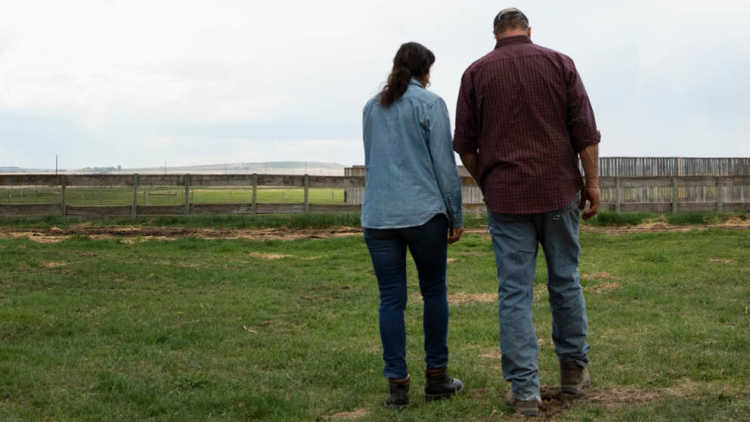Checking in on a loved one: how to tell if something isn’t right

This fictional scenario shows how challenged mental health can impact a farm family. For those living or working with people struggling with mental health, there are warning signs and steps that can be taken to help. For anyone dealing with mental health challenges, getting support can make a difference.
Grace had a feeling that something was wrong, and she was worried about her husband Zach. Married 20 years, Zach was the most capable, confident, optimistic and loving person she knew. Her sense that Zach wasn’t himself began six months earlier.
They’d met in university and returned to Zach’s family farm where his father Vince still farmed. Vince was old-school. Fiercely determined and independent, Vince built the farm up from nothing and was known for saying, “If you need a hand, the first place to look is at the end of your own arm.” Zach was a lot like his dad.
A gradual change
He seemed more tired, chores went unfinished, and he didn’t go crop checking anymore.
When Vince passed away 18 months earlier, Zach spoke highly of his dad, admiring his work ethic and dedication to farm and family. Zach spoke of carrying on the family farm legacy. Grace never saw Zach get emotional or cry at the funeral or any time after. As with most challenges, he forged ahead and seemed determined to take the farm to the next level like he and Vince had planned.
Over time, Grace saw changes in Zach’s usual behaviour. Normally his truck radio was cranked, but lately it wasn’t even turned on. He seemed more tired, chores went unfinished, and he didn’t go crop checking anymore. She saw one of Zach’s friends who joked that she must be keeping Zach busy because he kept turning down invitations to play golf, which was unusual. He made excuses to skip family gatherings. He even stopped shaving.
At times, Zach seemed like his old self but then Grace would find him in the shop, and he seemed distracted and far away. She asked Zach if he was OK and he brushed it off saying he was just tired.
Reaching out and listening
Grace planned a weekend getaway and they both enjoyed a break from the farm, talking and laughing like they always had, but her uncomfortable feeling didn’t go away. One night when Zach came in late from spraying, she got out of bed to see how the day went and heard Zach crying in the shower. It scared her to the core, but she didn’t know how to approach him. She didn’t want to upset him but knew she had to do something.
The next day she talked to him, “I’m worried about you, Zach. Please know I’m here for you.” Zach got angry and said he didn’t have time for this. Grace stood quietly, hoping to give him the space he needed to talk. After a few minutes, Zach turned and said, “I don’t know why I’m doing this anymore! All my life the farm has been about Dad and working to make him proud. I don’t care about any of it anymore and I know he would be disappointed in me. I’m letting you down too. Some days I just want to leave this place and never look back. I don’t know what’s wrong with me, I just can’t shake it.”
Grace was stunned. Their whole life had been about farming, and they loved it. The farm was doing well under Zach’s management and financially they were in good shape. She didn’t want to push with questions, so she said, “Thank you for telling me. I know this wasn’t easy. We can get through this together.”
Recognition and seeking help
Over the next few weeks, Zach and Grace talked more openly about what Zach was thinking and feeling. He realized that farming with his dad was a big part of his motivation. He didn’t realize how much he would miss that relationship. Zach told Grace he hadn’t been sleeping well and struggled to hide his unhappiness. Zach talked with his doctor who suggested he was experiencing symptoms of depression and recommended he see a counsellor.
Zach and Grace both met with a counsellor to help them understand and address their situation. The counsellor identified that farmers often work hard for their family, and changes due to death, divorce or transition can lead them to question their reason for continuing to farm.
Zach and Grace recognized that problems don’t go away on their own. They needed mental health supports to understand what they were dealing with and to learn strategies for moving forward. They became aware of how mental health, good or challenged, impacts the whole family and the operation, and that it was worth their time getting some support.
From a Rooted in Resilience article by Peter Gredig and Cynthia Beck.

Reaching out to others can help support your mental well-being. Learn what might be stopping you and when it’s important to seek help.
